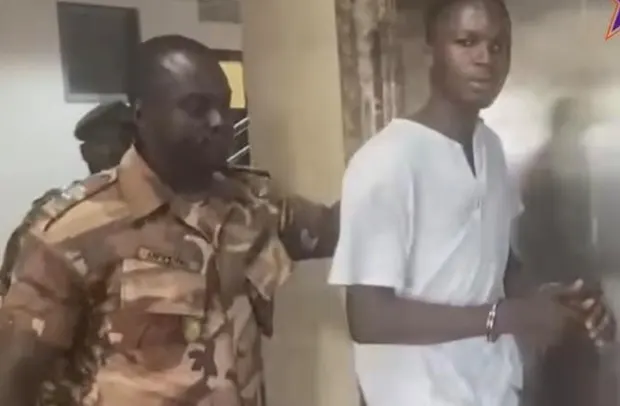JAILED! Nicholas Kini
Nicholas Kini, one of the two teenagers who killed a 10-year-old boy at Kasoa in 2021 for money ritual, has been sentenced to life imprisonment by a High Court in Accra yesterday.
His co-accused (name withheld), who is minor was also convicted on two charges of conspiracy to commit murder and a substantive charge of murder, but the court referred his sentencing to the juvenile court as he was a minor at the time he committed the crime.
The two lured the victim into an uncompleted building where they killed him with intent to use his body for money ritual. Luck eluded them and they were caught.
The trial judge, Justice Lydia Osei Marfo, a Justice of the Court of Appeal sitting as an additional High Court judge, in her summary of evidence to the jury blamed the act of the teenagers on parental neglect.
“The parents of the present generation are asleep while their children who should be asleep by them are widely awake. The consequence is a silent pandemic eroding our society and condemning our future generation to a life of trauma,” she stated.
She also quoted former First Lady of the United States Hilary Clinton that, when parents neglect their children, society pays the price.
“Nothing but parental neglect has brought us this far. If we don’t take care the very foundation of this nation will be destroyed,” Justice Marfo added.
Murder
The two teenagers were charged with two counts of conspiracy to commit murder, and the substantive charge of murder.
The court, during the prosecution’s case, heard that the young boy was still alive when the convicts buried him in a shallow grave.
The minor had confessed to the crime both at the District Court during the committal and at the High Court where they stood trial.
He subsequently pleaded not guilty to murder but pleaded guilty to conspiracy to commit murder. The court entered a plea of ‘not guilty’ for him.
Nicholas Kini, on the other hand, denied the offence both at the District Court and pleaded not guilty to conspiracy to commit murder and a substantive charge of murder at the High Court.
In his defence before the court, when his lawyer asked him to tell the court what he knows about the young boy’s death, he said, “I do not know anything about the death of Ishmael Mensah Abdallah.”
Prosecution’s Case
The prosecution led by Nana Adoma Osei, a Senior State Attorney, called seven witnesses, including the parents and younger sister of the minor to prove its case.
The investigator, Chief Inspector Isaac Asiedu Odei, as part of his testimony, told the court that one of the accused had confessed that he hit the deceased with a full block which later broke into pieces after landing on the forehead of the deceased.
A Pathologist at the Police Hospital, Assistant Commissioner of Police Osei Owusu Afriyie gave the cause of death as severe head injury from blunt trauma and asphyxiation because he was buried alive.
During their closing address, Madam Osei told the court that the prosecution had proved its case beyond reasonable doubt and urged the jury to return guilty verdict against the two.
Defence
Samuel Atuah, counsel for the minor, expressed condolence to the victim and his family, indicating that his client had already confessed to the crime but urged the jury to return a verdict of not guilty.
Lawrence Boampong, who held the brief of Martin Kpebu for Nicholas Kini, on his part told the court the accused has denied the offence and the prosecution could not prove his guilt beyond reasonable doubt, hence urged the jury to return a verdict of not guilty.
Verdict/Sentencing
The judge took time to summarise the case for the jury as well as directed them on what the law says and the threshold the prosecution must meet.
The jury then retired and returned after about five (5) minutes with a unanimous guilty verdict on both charges against the two.
Justice Marfo subsequently convicted the two and sentenced Nicholas Kini to life imprisonment, while remitting the minor to the juvenile court for sentencing per Section 342 of Act 30.
BY Gibril Abdul Razak


